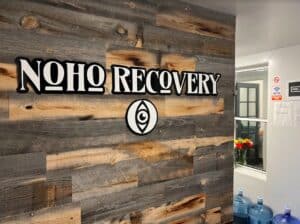Sonata Addiction, Abuse, And Treatment
Understanding Sonata
A non-Benzodiazepine Hypnotic prescribed to treat insomnia, Sonata is a brand name for Zaleplon. It sits among the popular prescription “Z-Drugs,” which also include Lunesta and Ambien, as a prominent sleep aid in America.
Sonata activates the neurotransmitter gamma-Aminobutyric acid (GABA), slowing mental processes, blocking feelings of anxiety and stress, and producing Sedative effects to help patients enjoy healthy, restful sleep. Users take Sonata orally as a capsule or tablet. Slang terms for Sonata include Downers, Tranks, and Sleepeasy.
Online Addiction Counseling
Get professional help from an online addiction and mental health counselor from BetterHelp.
- Access to Therapy 24/7
- Easy Online Scheduling
- 20,000+ Licensed Therapists
Paid Advertising. We may receive advertising fees if you follow links to the BetterHelp site.
Sonata Abuse And Effects
Sonata is one of the fastest-acting sleeping pills available, with a terminal half-life of an hour. As such, Sonata is a prime target for accidental and recreational abuse; people might overuse the drug as an immediate sleep aid. Like Lunesta and Ambien, Sonata is federally regulated as a Schedule IV controlled substance. Sonata is not considered as habit-forming as some sleep medicines, such as Ambien and Lunesta. It is, however, more likely to cause withdrawal symptoms if you suddenly stop using it after approximately 2 weeks of daily use. Any pattern of Sonata use deviating from a physician’s recommendation qualifies as abuse.
Those abusing Sonata will experience a mild, euphoric rush punctuated with bouts of hallucinations and ‘blackouts,’ or intermittent memory loss.
Those abusing Sonata may break capsules open or crush tablets and snort their contents, intensifying the drug’s “buzz” and hallucinatory properties (which only occur at extremely high doses). Sonata’s unique Sedative effect on the brain can also trigger unnerving behaviors in users — sleep-walking, sleep-eating, sleep-driving, and even having sex while asleep — all without recollection of having performed them. This is known as parasomnia. Forcing oneself awake after ingesting Sonata significantly raises the risk of unconscious behavior. Side effects of Sonata abuse might include:
- Mental confusion
- Nausea
- Vomiting
- Amnesia
- Numbness or tingling
- Hallucinations
- Impaired coordination
- Aggression and irritability
- Headache
- Fatigue
- Dizziness
- Abdominal pain
- Tremors
- Mood swings
Sonata is not as potent as some of its Z-Drug counterparts, but the danger of abuse persists. Overdosing on Sonata alone is relatively uncommon, but co-abusing the prescription drug alongside other CNS Depressants like alcohol — which happens frequently — can depress respiratory function to the point of failure and death.
Attempted suicides are the most common emergency room admission associated with Sonata use.
Signs Of A Sonata Addiction
Signs of a Sonata addiction can be hard for friends and family to spot. It can be difficult to tell the difference between addiction and prescriptive use of the drug. However, changes in behavior such as doctor shopping — acquiring multiple prescriptions for the drug — and using Sonata for any unprescribed purpose should be considered troubling.
One telltale sign of Sonata addiction is the development of a tolerance to the drug’s effects and subsequent withdrawal symptoms when quitting use. Sufferers might experience “rebound insomnia” (or a resurgent, intensified case of insomnia), a notorious withdrawal symptom and sign of chemical dependency. With long enough use, users eventually may not be able to fall asleep without taking Sonata. Learn the criteria professionals use to diagnose addiction now.
Some signs of Sonata addiction include:
- Rationalizing behavior to justify Sonata use.
- Inability to quit after multiple attempts to do so.
- Neglecting major responsibilities at work, home, or school.
- Inability to function without the use of Sonata.
- Taking Sonata in unintended ways, such as during the day.
- Having cravings or urges to use Sonata.
- Stealing in order to obtain Sonata.
- Excessive sleep or drowsiness.
- Taking Sonata in larger doses than prescribed.
- Using Sonata in methods other than prescribed.
- Doctor shopping.
- Increased tolerance.
- Withdrawal symptoms upon decrease of dosage or cessation of use.
- Engaging in hazardous behaviors while under the influence of Sonata.
- Verbal concerns from family members or friends about changes in mood and behavior or use of Sonata.
- Isolation from family and friends.
Looking for a place to start?
Join the thousands of people that have called a treatment provider for rehab information.
Free and confidential
Available 24/7
Access to professional treatment
Sonata Addiction Treatment
Sonata packs less of a punch than Ambien or Lunesta regarding addictive potential; over a long enough period of use, however, an addiction can develop.
Once the mind and body become dependent on Sonata, excruciating withdrawal symptoms can follow quitting use.
The variety and duration of withdrawal symptoms that Sonata users will experience are determined by a number of factors. Some of these include:
- The length of time a user has been taking Sonata.
- The average dose of Sonata they regularly took.
- How frequently they took Sonata.
- Whether they used Sonata with alcohol or any other drugs.
- Their mental health and medical history.
- Their gender.
- Their weight.
- How they took Sonata.
Sonata’s impact on brain chemistry essentially renders addiction sufferers incapable of functioning without it. Abruptly stopping Sonata use can induce convulsions, hallucinations, and even seizures.
Treatment programs for Sonata addiction are usually provided in residential and outpatient models, and the level of care depends on several factors; these include the amount of support at home, the type and manner of drugs abused, any underlying medical or mental health concerns, and the severity of the drug dependence. Before admission to any rehab program, a substance abuse assessment must be completed by an addiction professional to determine if the program is appropriate for the potential patient.
Check if my insurance covers rehab
Addiction Center is not affiliated with any insurance.
Inpatient Sonata Rehab
Inpatient rehab offers 24-hour supervised care at a live-in facility. Both psychiatric and physical health assistance are included in inpatient rehab. On average, clients will remain in inpatient rehab between 30 and 90 days. The goal of inpatient rehab is to return clients to a more independent lifestyle that does not involve the use of Sonata to cope with difficult emotions or life stressors. It provides education about the disease of addiction while teaching healthy coping skills for relapse prevention, trauma, anxiety, depression, and other struggles.
Outpatient Sonata Rehab
Unlike inpatient treatment, outpatient rehab does not require patients to stay at a treatment facility or have supervised medical care to address medical conditions. Outpatient rehab can be very useful for individuals who must continue to work or attend school or for adults with children who are unable to attend treatment for months at a time. There are different types of outpatient rehab programs that vary in intensity depending on the client’s needs. Typically, an outpatient program will require meeting at least a couple of times per week for a few hours each session. Outpatient treatment often involves group therapy, individual therapy, family therapy, and specialized therapy types, such as art or music therapy.
Outpatient therapy can also be used as an aftercare or step-down program upon completion of inpatient rehab to assist the client in transitioning back into their daily life while maintaining their recovery.
Sometimes, patients attend outpatient programs while staying in a sober living home (a residence in which drugs and alcohol are prohibited). In sober homes, residents typically are subject to periodic drug screenings and restrictions on curfew to ensure they remain sober.
Therapy For Sonata Addiction
Addiction treatment for Sonata may include the use of many types of therapy to help a person recover. Behavioral therapies like motivational interviewing (MI) and cognitive behavioral therapy (CBT) teach healthy coping mechanisms for stress and help individuals uncover the root causes of why they may be abusing drugs. They also help patients avoid or manage potential triggers. MI is a non-confrontational approach that aids individuals in finding the internal motivation to change while learning to accept themselves for who they are. CBT works to turn negative thoughts into positive ones, thus influencing self-esteem and modifying behaviors in turn.
Group and individual therapy and counseling sessions are typical elements of a Sonata abuse treatment program. Relapse prevention tools and communication skills are taught during these sessions. Support groups are formed that may help individuals to build a network of peers with a common interest and goal in remaining drug-free.
Improving Sleep In Sonata Addiction Treatment
Since Sonata is a sleep aid, individuals who are addicted to the drug may suffer from difficulties sleeping. Holistic methods may be useful during Sonata treatment and recovery to improve sleep. Yoga, meditation, mindfulness techniques, chiropractic care, stress management techniques, acupuncture, massage therapy, nutritional meal planning, and fitness programs may all be beneficial in promoting healthy sleep habits.
Methods of reducing stress and anxiety, which may include the use of Antidepressant or anti-anxiety medications, may also be helpful. When someone is well-rested, that person is better able to handle stressors and think clearly. As a result, improving sleep quality can enhance overall quality of life.
Tips for improving sleep include:
- Setting and sticking to a regular sleep schedule with set wake and sleep times.
- Eating a balanced diet.
- Avoiding caffeine.
- Engaging in regular physical activity.
- Using relaxation techniques.
- Avoiding naps during the day.
- Avoiding stimulation right before bed.
- Keeping the bedroom dark and using it mainly for sleep.
Sonata Abuse Statistics
60
million
Americans filled approximately 60 million prescriptions for sleeping pills in 2011.
44%
higher risk
People taking sleeping pills have about a 44% higher risk of developing infections such as sinusitis, upper respiratory tract infections, herpes, and more.
1 in 500
children
Approximately one in 500 children in the United States are on sleeping pills.
Suicidal ideation can manifest and lead to tragedy. Physician-proctored detoxification helps diminish severe withdrawals, allows for behavioral observation, and reduces the potential for adverse complications such as seizures. Treatment centers across the country focus on helping Sonata addiction sufferers recover mentally and physically, as well as decreasing the odds of relapse.
Find Treatment
Prescription sleeping pill addiction plagues millions of Americans, but hope for recovery is out there. Community support groups and inpatient and outpatient treatment programs can equip sufferers with the resources needed to overcome this debilitating struggle. Contact a treatment provider today to discuss Sonata treatment options.
Published:
Author
Jeffrey Juergens

-
Jeffrey Juergens earned his Bachelor’s and Juris Doctor from the University of Florida. Jeffrey’s desire to help others led him to focus on economic and social development and policy making. After graduation, he decided to pursue his passion of writing and editing. Jeffrey’s mission is to educate and inform the public on addiction issues and help those in need of treatment find the best option for them.
- More from Jeffrey Juergens
Reviewed by Certified Addiction Professional:
Theresa Parisi

Theresa Parisi is a Certified Addiction Professional (CAP), Certified Behavioral Health Case Manager (CBHCM), and International Certified Alcohol and Drug Counselor (ICADC) with over 12 years of experience in the addiction treatment field.
- More from Theresa Parisi
Sources


Recovery Starts Today
Call Now For Addiction Support



Newport Academy – Teen Rehab Center
Port Townsend , WA


Sequoia Detox Centers
Spokane Valley , WA



Moonlight Mountain Recovery – Nampa
Nampa , ID

Bayside Marin Treatment Center
San Rafael , CA

Newport Institute for Young Adults
Sunol , CA

The Camp Recovery Center
Scotts Valley , CA

Moonlight Mountain Recovery
Pocatello , ID


Tarzana Recovery Center – TRC
Tarzana , CA

